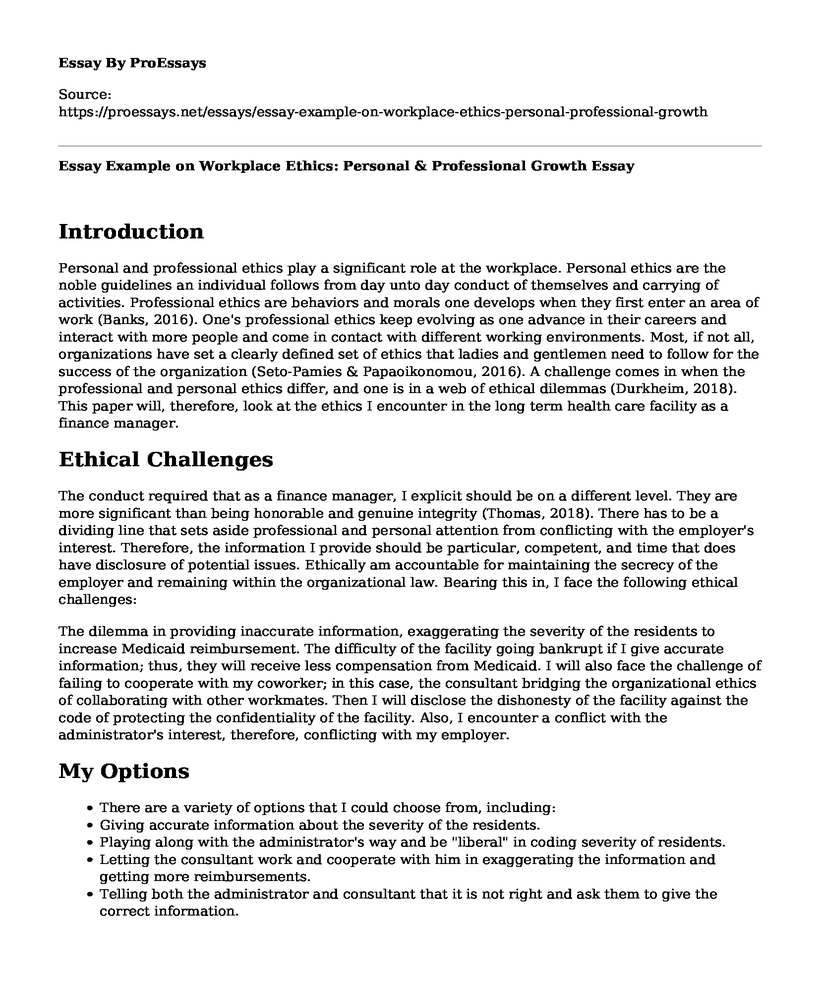Introduction
Personal and professional ethics play a significant role at the workplace. Personal ethics are the noble guidelines an individual follows from day unto day conduct of themselves and carrying of activities. Professional ethics are behaviors and morals one develops when they first enter an area of work (Banks, 2016). One's professional ethics keep evolving as one advance in their careers and interact with more people and come in contact with different working environments. Most, if not all, organizations have set a clearly defined set of ethics that ladies and gentlemen need to follow for the success of the organization (Seto-Pamies & Papaoikonomou, 2016). A challenge comes in when the professional and personal ethics differ, and one is in a web of ethical dilemmas (Durkheim, 2018). This paper will, therefore, look at the ethics I encounter in the long term health care facility as a finance manager.
Ethical Challenges
The conduct required that as a finance manager, I explicit should be on a different level. They are more significant than being honorable and genuine integrity (Thomas, 2018). There has to be a dividing line that sets aside professional and personal attention from conflicting with the employer's interest. Therefore, the information I provide should be particular, competent, and time that does have disclosure of potential issues. Ethically am accountable for maintaining the secrecy of the employer and remaining within the organizational law. Bearing this in, I face the following ethical challenges:
The dilemma in providing inaccurate information, exaggerating the severity of the residents to increase Medicaid reimbursement. The difficulty of the facility going bankrupt if I give accurate information; thus, they will receive less compensation from Medicaid. I will also face the challenge of failing to cooperate with my coworker; in this case, the consultant bridging the organizational ethics of collaborating with other workmates. Then I will disclose the dishonesty of the facility against the code of protecting the confidentiality of the facility. Also, I encounter a conflict with the administrator's interest, therefore, conflicting with my employer.
My Options
- There are a variety of options that I could choose from, including:
- Giving accurate information about the severity of the residents.
- Playing along with the administrator's way and be "liberal" in coding severity of residents.
- Letting the consultant work and cooperate with him in exaggerating the information and getting more reimbursements.
- Telling both the administrator and consultant that it is not right and ask them to give the correct information.
My Chosen Course of Action
Thinking through the varied options, I choose to inform the administrator and consultant that it is not right to exaggerate figures. It doesn't matter if they do it, and they have not detected their actions before. Their steps soon will come in the sunlight and be discovered if not on this. Then I will give the correct information on the residents.
Consequences of The Chosen Course of Action
Any option we chose or ignored presents with dire consequences. The administrator and consultant could either agree or disagree with my suggestion. If they agree, we will start the cleanup process together and create an integrity facility. If they disagree, then it can lead to a constraint relationship with the administrator, consultant, and I. Further giving of accurate information that I will send to the Medicaid reimbursement. The facility will be in the midst of a financial crisis but create an honest, noble, and trustworthy facility (Trautman, 2017). The facility will have to start minimizing their expenditure and working within their financial aids. It will then create a credible facility that residents have confidence in, maybe gain trust from other potential sponsors to uplift the economic status. Another risk is the consultant will not earn enough commission, and I will risk losing my job and leave a broken-down facility financially.
Conclusion
In conclusion, accurate information is an aspect of both professional and personal ethics. I believe the truth will always be detected no matter how crafty we are (Feldman, 2019). Therefore maintaining the fact amidst pressure from employers and coworkers is a great test of integrity, and keeping ethics is a noble calling.
References
Banks, S. (2016). Everyday ethics in professional life: Social work as ethics work. Ethics and Social Welfare, 10(1), 35-52.
Durkheim, E. (2018). Professional ethics and civic morals. Routledge.
Feldman, S. (2019). Memory as a moral decision: The role of ethics in organizational culture. Routledge.
Seto-Pamies, D., & Papaoikonomou, E. (2016). A multi-level perspective for the integration of ethics, corporate social responsibility, and sustainability (ECSRS) in management education. Journal of Business Ethics, 136(3), 523-538.
Thomas, S. (2018). Management Accountants' Professionalism and Ethics. Research on Professional Responsibility and Ethics in Accounting (pp. 169-192). Emerald Publishing Limited.
Trautman, L. J. (2017). Personal Ethics & the US Financial Collapse of 2007-08. Available at SSRN 2502124.
Cite this page
Essay Example on Workplace Ethics: Personal & Professional Growth. (2023, Feb 27). Retrieved from https://proessays.net/essays/essay-example-on-workplace-ethics-personal-professional-growth
If you are the original author of this essay and no longer wish to have it published on the ProEssays website, please click below to request its removal:
- Leadership and Motivation of School Employees Essay
- Data Management in Equifax Paper Example
- Ethics in Leadership Decision-Making - Essay Sample
- Essay Example on Leadership: A Crucial Concept for Everyday Life
- Essay on Unethical Behaviors in Organizations: Impact & Prevention
- Essay Example on Hiring Financial Manager: Job Specs, Compensations & Benefits
- Essay on Applying for International Baccalaureate (IB) Diploma Program (DP): Exploring My Future Career Path







